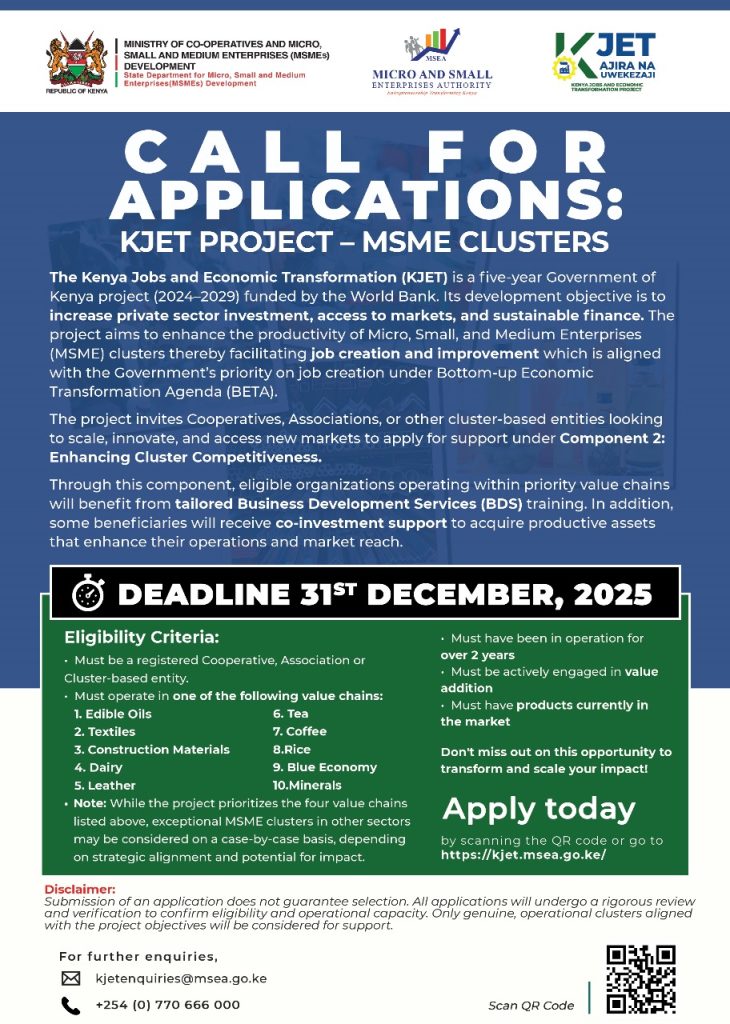KENYA JOBS AND ECONOMIC TRANSFORMATION (KJET) PROJECT
Kenya Jobs and Economic Transformation (KJET) is 5-year Government of Kenya project funded by the World Bank (2024-2029). The project development objective (PDO) is ‘To increase private sector investments, access to markets and sustainable finance to create and improve jobs’. The project targets to create and improve productivity of select MSME clusters based on priority value chains envisioned under the Bottom-Up Economic Transformation Agenda. benefit at least 45,000 Kenyans, including at least 6,800 women through new or improved job opportunities.
Project Components
- Strengthening Business and Investment Enabling Reforms.
This component will offer a comprehensive set of interventions that are expected to support business and investment enabling reforms in Kenya that will result in streamlined licensing processes; improved investment-related laws, regulations, and strategies; enhanced government capacity for investor outreach and government to business service delivery. It will finance technical assistance and Performance-Based Conditions (PBCs), which will support the design and implementation of well-defined regulatory reforms affecting business entry and operations. This component is implemented by the State Department for Investment Promotion and the Kenya Investment Authority (KenInvest).
- Enhancing MSME Cluster Competitiveness.
This component aims to strengthen competitiveness and market access of the MSMEs through provision of Generalized and Value Chain Specific Business Development Services as well as co-investment in viable MSME clusters.
- Scaling Up Green Financing and Strengthening Climatic Resilience for SMEs.
This component is meant to mobilize green private capital to support SME’s adoption of green, clean and eco-friendly technologies through setting up an agile, patient financing structure that is able to crowd in private capital, especially for medium businesses. It will also pilot an innovative instrument to support SMEs in managing compound shocks including climatic risks. This component is implemented by the Kenya Development Corporation Ltd (KDC)
- Project Management, Monitoring and Evaluation.
This component will strengthen the Monitoring and Evaluation (M&E) systems and capacity of national implementing agencies, and finance project management activities with the aim to build sustainable systems that last beyond the lifetime of this project. The State Department for Micro, Small and Medium Enterprises (MSMEs) Development oversees Project Management, Monitoring and Evaluation.
Focus on component 2: Enhancing MSME Cluster Competitiveness
Component 2 of the Kenya Jobs and Economic Transformation (KJET) project, implemented by the Micro and Small Enterprises Authority (MSEA), focuses on Business Development Services (BDS) and Investment Support for Micro, Small, and Medium Enterprises (MSMEs). The goal is to enhance productivity, efficiency, and job creation within MSME clusters across the 47 Counties.
The program prioritizes specific value chains under the Bottom-Up Economic Transformation Agenda. These value chains were selected for their high potential in employment generation and market demand. They include; Edible Oils, Building Materials (Construction), Textiles, Tea, Coffee, Dairy, Leather, Blue Economy and Minerals
Targeted MSME Clusters
KJET identifies MSME clusters, which include MSE Associations and Cooperatives, as the key beneficiaries. The structured approach ensures that businesses operating in similar industries can benefit from shared resources, training, and investment support.
Key interventions
- Business Development Services (BDS)
Under this component, 1,200 MSME clusters will receive free generalized and specialized training and capacity building to improve operational efficiency.
- Co-Investment Support
To enhance production capabilities, 600 MSME clusters will receive co-investment support, specifically for acquiring machinery. The investment model follows a co-financing approach:
- The project covers 70% of the machinery cost.
- The MSME clusters contribute 30% of the investment.







